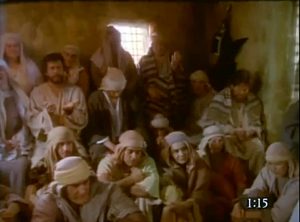John 7.1

‘After this Jesus went about in Galilee. He would not go about in Judea, because the Jews were seeking to kill him.’ John 7.1
When John refers to the ‘Jews” he is not making an anti-semitic statement, after all both Jesus and John were Jews. He was referring to the Jewish religious leadership. It was they who were plotting to have him killed. Jesus was ready for the final show down, there was still teaching to do, preparation of his disciples to undertake and signs to perform. Jesus was entirely obedient to his Father’s will. As he said to the Jewish leaders, ‘I have not come of my own accord. He who sent me is true, and him you do not know. I know him, for I come from him and he sent me.’ John 7.28,29
Jesus was living in a hostile environment created by the political and religious leaders of the day. The environment was so hostile it threatened and eventually took his life. Is it shocking to you that for vast numbers of disciples of Jesus 2000 years later it is still a hostile environment created by the political and religious leaders? Do we think that this is only something that takes place in distant countries and therefore we may occasionally pray but it isn’t something that is close to home. When Jesus told his disciples, ‘If anyone would come after me, let him deny himself and take up his cross and follow me. 25 For whoever would save his life[a] will lose it, but whoever loses his life for my sake will find it. 26 For what will it profit a man if he gains the whole world and forfeits his soul? Or what shall a man give in return for his soul?’ Was he establishing a general principle, possibly literally applicable then, but not meant in such stark terms in western Europe in the 21st Century?
When the UK government officially took the stance that they were creating a hostile environment towards asylum seekers included in that policy were large numbers of Christians fleeing threats to their lives as Jesus fled the swords of Herod’s soldiers. In conversation with and accompanying asylum seekers to their solicitors I have listened to their traumatised accounts of life in their country of origin and their journey to a country they believed was compassionate. The process though from the asylum seekers perspective is usually lengthy, difficult to understand, frightening and when faced by the complexity of our legal system and highly paid barristers, instructed to find every legal reason to oppose their claim, it is difficult for it not to feel hostile. Sadly, for many regardless of the legally proven outcome, if claimants are sent to their country of origin they will face imprisonment for their faith, potentially torture or even death.
In conversation with an Iranian Christian he explained that Christians who met in underground churches were often ‘disappeared’. He had been reported to the secret police by a family member who found a bible in his car. He left the country just before his family home was raided in search of him. Another Iranian woman explained she fled the country after she witnessed from further down the street her church meeting being raided and all those there taken off to prison. Why should we care? Simply, they are our family. It is our brothers and sisters living in the hostile environment.
The issue of a hostile environment is not just an issue about migration. The UK church has often been guilty of creating a hostile environment for its own through abuse conducted under the protection of the church. This week a report is being published that shows that survivors of abuse within the church have been subject to a double dose of abuse. In addition to the original abuse, the way in which the leadership and structures of the church, from Bishop level onwards, including solicitors working on behalf of the church, have conducted their investigations has grossly added to survivors’ suffering.
Whistle blowers in the church institutions are no more welcome than they are in business and governmental departments. We have in our Lord Jesus a God, Saviour and High Priest who fully understands the path of suffering and the experience of living in a hostile environment.
Are we able to learn from Jesus’ own experience?
What have we to learn from those who suffer for their love of Jesus?
How can we protect the weak within our church?
Search Me, O God – Jeharna South




